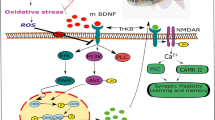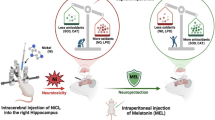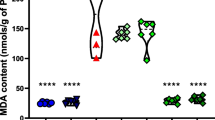Abstract
Cholinergic deficits and oxido-nitrosative stress are consistently associated with Alzheimer’s disease (AD). Previous findings indicate that acetylcholine subdues Ca2+ current in the brain. Cholinergic antagonists (e.g., scopolamine) can instigate Ca2+-induced redox imbalance, inflammation, and cell-death pathways leading to AD-type memory impairment. Earlier, several Ca2+-channel blockers (CCB, e.g., dihydropyridine type) or cholinergic enhancers showed promising results in animal models of AD. In the present research, pretreatment effects of lacidipine (L-type CCB) on learning and memory functions were investigated using the scopolamine mouse model of AD. Swiss albino mice (20–25 g) were administered lacidipine (1 and 3 mg/kg) for 14 days. Scopolamine, an anti-muscarinic drug, was given (1 mg/kg) from days 8 to 14. The mice were subjected to elevated plus maze (EPM) and passive-avoidance (PA) paradigms. Bay-K8644 (a Ca2+-channel agonist) was administered before behavioral studies on days 13 and 14. Biochemical parameters of oxidative stress and acetylcholinesterase (AChE) activity were quantified using the whole brain. Behavioral studies showed an increase in transfer latency (TL) in the EPM test and a decrease in step-through latency (STL) in the PA test in scopolamine-administered mice. Scopolamine enhanced the AChE activity and oxidative stress in the brain of mice which resulted in memory impairment. Lacidipine prevented the amnesia against scopolamine and reduced the oxidative stress and AChE activity in the brain of mice. Bay-K8644 attenuated the lacidipine-induced improvement in memory and redox balance in scopolamine-administered mice. Lacidipine can prevent the oxidative stress and improve the cholinergic function in the brain. These properties of lacidipine can mitigate the pathogenesis of AD-type dementia.







Similar content being viewed by others
Data Availability
The data can be made available on request.
Abbreviations
- ACh:
-
Acetylcholine
- AChE:
-
Acetylcholinesterase
- AD:
-
Alzheimer’s disease
- AIF:
-
Apoptosis-inducing factor
- AMPA:
-
α-Amino-3-hydroxy-5-methyl-4-isoxazolepropionic acid
- ANOVA:
-
Analysis of variance
- AThCh:
-
Acetylthiocholine
- Aβ :
-
Amyloid-β
- Bad:
-
BCL2-associated agonist of cell death
- Bax:
-
Bcl-2-associated X protein
- Bcl-xL:
-
B-cell lymphoma-extra large
- Ca2 + :
-
Calcium
- CAT:
-
Catalase
- CCB:
-
Calcium channel blocker
- CDK-5:
-
Cyclin-dependent kinase 5
- CPCSEA:
-
Committee for the Purpose of Control and Supervision of Experiments on Animals
- DMSO:
-
Dimethyl sulfoxide
- EPM:
-
Elevated plus maze
- GABA:
-
γ-Amino butyric acid
- GSH:
-
Glutathione
- GSK-3β :
-
Glycogen synthase kinase
- H2O2 :
-
Hydrogen peroxide
- i.p. :
-
Intraperitoneal
- iNOS:
-
Inducible nitric oxide synthase
- LCD:
-
Lacidipine
- LTP:
-
Long-term potentiation
- mA:
-
Milliampere
- MCI:
-
Mild cognitive impairment
- MDA:
-
Malondialdehyde
- nbM:
-
Nucleus basalis of Meynert
- NFTs:
-
Neurofibrillary tangles
- NFκB:
-
Nuclear factor kappa-light-chain-enhancer of activated B cells
- NMDA:
-
N-Methyl D-aspartate
- NO:
-
Nitric oxide
- PA:
-
Passive avoidance
- ROS:
-
Reactive oxygen species
- SOD:
-
Superoxide dismutase
- STL:
-
Step-through latency
- TL:
-
Transfer latency
- UPS:
-
Ubiquitin–proteasome system
- W:
-
Watt
- λ max :
-
Maximum wavelength
References
Anacak GY, Ustunes L, Dilsiz OY, Ergul A (2010) Lacidipine has antiatherosclerotic effects independent of its actions on lipid metabolism and blood pressure. Vascul Pharmacol 53(5–6):193–199. https://doi.org/10.1016/j.vph.2010.08.003
Anekonda TS, Quinn JF (2011) Calcium channel blocking as a therapeutic strategy for Alzheimer’s disease: the case for isradipine. Biochim Biophys Acta 12:1584–1590. https://doi.org/10.1016/j.bbadis.2011.08.013
Ardura-Fabregat A, Boddeke EWGM, Boza-Serrano A, Brioschi S, Castro-Gomez S, Ceyzeriat K, Dansokho C, Dierkes T, Gelders G, Heneka MT, Hoeijmakers L, Hoffmann A, Iaccarino L, Jahnert S, Kuhbandner K, Landreth G, Lonnemann N, Löschmann PA, McManus RM, Paulus A, Reemst K, Sanchez-Caro JM, Tiberi A, Van der Perren A, Vautheny A, Venegas C, Webers A, Weydt P, Wijasa TS, Xiang X, Yang Y (2017) Targeting neuroinflammation to treat Alzheimer’s disease. CNS Drugs 31(12):1057–1082. https://doi.org/10.1007/s40263-017-0483-3
Asiimwe N, Yeo SG, Kim MS, Jung J, Jeong NY (2016) Nitric oxide: Exploring the contextual link with Alzheimer’s disease. Oxid Med Cell Longev 2016:7205747. https://doi.org/10.1155/2016/7205747
Axelsen PH, Komatsu H, Murray IV (2011) Oxidative stress and cell membranes in the pathogenesis of Alzheimer’s disease. Physiology (Bethesda) 26(1):54–69. https://doi.org/10.1152/physiol.00024.2010
Bellosta S, Canavesi M, Favari E, Cominacini L, Gaviraghi G, Fumagalli R, Paoletti R, Bernini F (2001) Lacidipine modulates the secretion of matrix metalloproteinase-9 by human macrophages. J Pharmacol Exp Ther 296:736–743
Bhuvanendran S, Kumari Y, Othman I, Shaikh MF (2018) Amelioration of cognitive deficit by embelin in a scopolamine-induced Alzheimer’s disease-like condition in a rat model. Front Pharmacol 9:665. https://doi.org/10.3389/fphar.2018.00665
Bihaqi SW, Singh AP, Tiwari M (2012) Supplementation of Convolvulus pluricaulis attenuates scopolamine-induced increased tau and amyloid precursor protein (AβPP) expression in rat brain. Indian J Pharmacol 44(5):593–598. https://doi.org/10.4103/0253-7613.100383
Bondi MW, Edmonds EC, Salmon DP (2017) Alzheimer’s disease: past, present, and future. J Int Neuropsychol Soc 23(9–10):818–831. https://doi.org/10.1017/S135561771700100X
Budzynska B, Boguszewska-Czubara A, Kruk-Slomka M, Skalicka-Wozniak K, Michalak A, Musik I, Biala G (2015) Effects of imperatorin on scopolamine-induced cognitive impairment and oxidative stress in mice. Psychopharmacology 232(5):931–942. https://doi.org/10.1007/s00213-014-3728-6
Cerella C, Diederich M, Ghibelli L (2010) The dual role of calcium as messenger and stressor in cell damage, death, and survival. Int J Cell Biol 2010:546163. https://doi.org/10.1155/2010/546163
Chen XQ, Mobley WC (2019) Exploring the pathogenesis of Alzheimer disease in basal forebrain cholinergic neurons: converging insights from alternative hypotheses. Front Neurosci 13:446. https://doi.org/10.3389/fnins.2019.00446
Claiborne A (1985) Catalase activity. In: Greenwald AR (ed) Handbook of methods for oxygen radical research. CRC Press Inc, Florida, pp 237–242
Cominacini L, Fratta Pasini A, Garbin U, Pastorino AM, Davoli A, Nava C, Campagnola M, Rossato P, Lo Cascio V (2003) Antioxidant activity of different dihydropyridines. Biochem Biophys Res Commun 302(4):679–684. https://doi.org/10.1016/s0006-291x(03)00158-x
Cosentino S, Metcalfe J, Cary MS, De Leon J, Karlawish J (2011) Memory awareness influences everyday decision making capacity about medication management in Alzheimer’s disease. Int J Alzheimers Dis 2011:483897. https://doi.org/10.4061/2011/483897
Croxson PL, Browning PG, Gaffan D, Baxter MG (2012) Acetylcholine facilitates recovery of episodic memory after brain damage. J Neurosci 32(40):13787–13795. https://doi.org/10.1523/JNEUROSCI.2947-12.2012
Dasgupta A, Dastidar SG (2012) Antibacterial & antitoxic effects of the cardiovascular drug lacidipine in an animal model. Indian J Med Res 135(6):913–916
Deiana S, Platt B, Riedel G (2011) The cholinergic system and spatial learning. Behav Brain Res 221(2):389–411. https://doi.org/10.1016/j.bbr.2010.11.036
Dennis SH, Pasqui F, Colvin EM, Sanger H, Mogg AJ, Felder CC, Broad LM, Fitzjohn SM, Isaac JT, Mellor JR (2016) Activation of muscarinic M1 acetylcholine receptors induces long-term potentiation in the hippocampus. Cereb Cortex 26(1):414–426. https://doi.org/10.1093/cercor/bhv227
DeTure MA, Dickson DW (2019) The neuropathological diagnosis of Alzheimer’s disease. Mol Neurodegener 14(1):32. https://doi.org/10.1186/s13024-019-0333-5
Dhingra D, Soni K (2018) Behavioral and biochemical evidences for nootropic activity of boldine in young and aged mice. Biomed Pharmacother 97:895–904. https://doi.org/10.1016/j.biopha.2017.11.011
Ellman GL (1959) Tissue sulfhydryl groups. Arch Biochem Biophys 82(1):70–77. https://doi.org/10.1016/0003-9861(59)90090-6
Ellman GL, Courtney KD, Andres V Jr, Feather-Stone RM (1961) A new and rapid colorimetric determination of acetylcholinesterase activity. Biochem Pharmacol 7(2):88–95. https://doi.org/10.1016/0006-2952(61)90145-9
Firstova YY, Abaimov DA, Kapitsa IG, Voronina TA, Kovalev GI (2011) The effects of scopolamine and the nootropic drug phenotropil on rat brain neurotransmitter receptors during testing of the conditioned passive avoidance task. Neurochem J 5:115–125. https://doi.org/10.1134/S1819712411020048
Frinchi M, Nuzzo D, Scaduto P, Di Carlo M, Massenti MF, Belluardo N, Mudo G (2019) Anti-inflammatory and antioxidant effects of muscarinic acetylcholine receptor (mAChR) activation in the rat hippocampus. Sci Rep 9(1):14233. https://doi.org/10.1038/s41598-019-50708-w
Garcia-Ayllon MS, Small DH, Avila J, Saez-Valero J (2011) Revisiting the role of acetylcholinesterase in Alzheimer’s disease: cross-talk with p-tau and β-amyloid. Front Mol Neurosci 4:22. https://doi.org/10.3389/fnmol.2011.00022
Garzotti M (2003) Lacidipine, a potential peroxynitrite scavenger: investigation of activity by liquid chromatography and mass spectrometry. Rapid Commun Mass Spectrom 17(4):272–278. https://doi.org/10.1002/rcm.910
Gilles C, Ertle S (2000) Pharmacological models in Alzheimer’s disease research. Dialogues Clin Neurosci 2(3):247–255
Godfraind T, Salomone S (1991) Functional interaction of lacidipine with calcium channels in vascular smooth muscle. J Cardiovasc Pharmacol 18(Suppl 11):S1–S6. https://doi.org/10.1097/00005344-199102001-00001
Gold PE (2004) Coordination of multiple memory systems. Neurobiol Learn Mem 82(3):230–242. https://doi.org/10.1016/j.nlm.2004.07.003
Guan ZZ (2008) Cross-talk between oxidative stress and modifications of cholinergic and glutaminergic receptors in the pathogenesis of Alzheimer’s disease. Acta Pharmacol Sin 29(7):773–780. https://doi.org/10.1111/j.1745-7254.2008.00819.x
Haam J, Yakel JL (2017) Cholinergic modulation of the hippocampal region and memory function. J Neurochem 142(Suppl 2):111–121. https://doi.org/10.1111/jnc.14052
Higgins D, Graupner M, Brunel N (2014) Memory maintenance in synapses with calcium-based plasticity in the presence of background activity. Plos Comput Biol 10(10):e1003834. https://doi.org/10.1371/journal.pcbi.1003834
Impey S, Smith DM, Obrietan K, Donahue R, Wade C, Storm DR (1998) Stimulation of cAMP response element (CRE)-mediated transcription during contextual learning. Nat Neurosci 1(7):595–601. https://doi.org/10.1038/2830
Iqbal S, Shah FA, Naeem K, Nadeem H, Sarwar S, Ashraf Z, Imran M, Khan T, Anwar T, Li S (2020) Succinamide derivatives ameliorate neuroinflammation and oxidative stress in scopolamine-induced neurodegeneration. Biomolecules 10(3):443. https://doi.org/10.3390/biom10030443
Itoh J, Nabeshima T, Kameyama T (1990) Utility of an elevated plus-maze for the evaluation of memory in mice: effects of nootropics, scopolamine and electroconvulsive shock. Psychopharmacology 101:27–33. https://doi.org/10.1007/bf02253713
Jackson KJ, Damaj MI (2009) L-Type calcium channel and calcium/calmodulin-dependent kinase II differentially mediate behaviors associated with nicotine withdrawal in mice. J Pharmacol Exp Ther 330(1):152–161. https://doi.org/10.1124/jpet.109.151530
Jeong EJ, Lee KY, Kim SH, Sung SH, Kim YC (2008) Cognitive-enhancing and antioxidant activities of iridoid glycosides from Scrophularia buergeriana in scopolamine-treated mice. Eur J Pharmacol 588(1):78–84. https://doi.org/10.1016/j.ejphar.2008.04.015
Kamal SM (2013) Possible hepatoprotective effects of lacidipine in irradiated DOCA-salt hypertensive albino rats. Pak J Biol Sci 16(21):1353–1357. https://doi.org/10.3923/pjbs.2013.1353.1357
Kamat PK, Kalani A, Rai S, Swarnkar S, Tota S, Nath C, Tyagi N (2016) Mechanism of oxidative stress and synapse dysfunction in the pathogenesis of Alzheimer’s disease: understanding the therapeutics strategies. Mol Neurobiol 53(1):648–661. https://doi.org/10.1007/s12035-014-9053-6
Kametani F, Hasegawa M (2018) Reconsideration of amyloid hypothesis and tau hypothesis in Alzheimer’s disease. Front Neurosci 12:25. https://doi.org/10.3389/fnins.2018.00025
Kar S, Slowikowski SP, Westaway D, Mount HT (2004) Interactions between beta-amyloid and central cholinergic neurons: implications for Alzheimer’s disease. J Psychiatry Neurosci 29(6):427–441
Khurana K, Bansal N (2019a) Lacidipine attenuates reserpine-induced depression-like behavior and oxido-nitrosative stress in mice. Naunyn Schmiedeberg’s Arch Pharmacol 392(10):1265–1275. https://doi.org/10.1007/s00210-019-01667-6
Khurana K, Bansal N (2019b) Lacidipine attenuates caffeine-induced anxiety-like symptoms in mice: role of calcium-induced oxido-nitrosative stress. Pharmacol Rep 71(6):1264–1272. https://doi.org/10.1016/j.pharep.2019.07.008
Kim MS, Lee DY, Lee J, Kim HW, Sung SH, Han JS, Jeon WK (2018) Terminalia chebula extract prevents scopolamine-induced amnesia via cholinergic modulation and anti-oxidative effects in mice. BMC Complement Altern Med 18(1):136. https://doi.org/10.1186/s12906-018-2212-y
Kurbatskaya K, Phillips EC, Croft CL, Dentoni G, Hughes MM, Wade MA, Al-Sarraj S, Troakes C, O’Neill MJ, Perez-Nievas BG, Hanger DP, Noble W (2016) Upregulation of calpain activity precedes tau phosphorylation and loss of synaptic proteins in Alzheimer’s disease brain. Acta Neuropathol Commun 4:34. https://doi.org/10.1186/s40478-016-0299-2
Lee CR, Bryson HM (1994) Lacidipine. A review of its pharmacodynamic and pharmacokinetic properties and therapeutic potential in the treatment of hypertension. Drugs 48(2):274–296. https://doi.org/10.2165/00003495-199448020-00010
Lee GY, Lee C, Park GH, Jang JH (2017) Amelioration of scopolamine-induced learning and memory impairment by -Pinene in C57BL/6 mice. Mice Evid-Based Complementary Altern Med 2017:1–9
Liu Z, Qin G, Mana L, Dong Y, Huang S, Wang Y, Wu Y, Shi J, Tian J, Wang P (2020) GAPT regulates cholinergic dysfunction and oxidative stress in the brains of learning and memory impairment mice induced by scopolamine. Brain Behav 10(5):e01602. https://doi.org/10.1002/brb3.1602
Lowry OH, Rosebrough NJ, Farr A, Randall RJ (1951) Protein measurement with the Folin phenol reagent. J Biol Chem 193(1):265–275
Magi S, Castaldo P, Macrì ML, Maiolino M, Matteucci A, Bastioli G, Gratteri S, Amoroso S, Lariccia V (2016) Intracellular calcium dysregulation: implications for Alzheimer’s disease. Biomed Res Int 2016:6701324. https://doi.org/10.1155/2016/6701324
Majdi A, Sadigh-Eteghad S, RahighAghsan S, Farajdokht F, Vatandoust SM, Namvaran A, Mahmoudi J (2020) Amyloid-β, tau, and the cholinergic system in Alzheimer’s disease: seeking direction in a tangle of clues. Rev Neurosci 31(4):391–413. https://doi.org/10.1515/revneuro-2019-0089
Marambaud P, Dreses-Werringloer U, Vingtdeux V (2009) Calcium signaling in neurodegeneration. Mol Neurodegener 4:20. https://doi.org/10.1186/1750-1326-4-20
McCormack PL, Wagstaff AJ (2003) Lacidipine: a review of its use in the management of hypertension. Drugs 63:2327–2356. https://doi.org/10.2165/00003495-200363210-00008
Melo JB, Agostinho P, Oliveira CR (2003) Involvement of oxidative stress in the enhancement of acetylcholinesterase activity induced by amyloid beta-peptide. Neurosci Res 45(1):117–127. https://doi.org/10.1016/s0168-0102(02)00201-8
Mesulam M (2004) The cholinergic lesion of Alzheimer’s disease: pivotal factor or side show? Learn Mem 11(1):43–49. https://doi.org/10.1101/lm.69204
Mesulam MM (2013) Cholinergic circuitry of the human nucleus basalis and its fate in Alzheimer’s disease. J Comp Neurol 521(18):4124–4144. https://doi.org/10.1002/cne.23415
Micheli D, Ratti E, Toson G, Gaviraghi G (1991) Pharmacology of lacidipine, a vascular-selective calcium antagonist. J Cardiovasc Pharmacol 17(Suppl 4):S1–S8
Naj AC, Schellenberg GD (2017) Alzheimer’s disease genetics consortium (ADGC). Genomic variants, genes, and pathways of Alzheimer’s disease: an overview. Am J Med Genet B Neuropsychiatr Genet 174(1):5–26. https://doi.org/10.1002/ajmg.b.32499
Norman G, Brooks SP, Hennebry GM, Eacott MJ, Little HJ (2002) Nimodipine prevents scopolamine-induced impairments in object recognition. J Psychopharmacol 16(2):153–161. https://doi.org/10.1177/026988110201600206
Ohkawa H, Ohishi N, Yagi K (1979) Assay for lipid peroxidases in animal tissues by thiobarbituric acid reaction. Anal Biochem 95(2):351–358. https://doi.org/10.1016/0003-2697(79)90738-3
Parle M, Dhingra D (2003) Ascorbic acid: a promising memory-enhancer in mice. J Pharmacol Sci 93:129–135. https://doi.org/10.1254/S1347-8613(19)32588-5
Pepeu G, Giovannini MG (2010) Cholinesterase inhibitors and memory. Chem Biol Interact 187(1–3):403–408. https://doi.org/10.1016/j.cbi.2009.11.018
Popovic M, Caballero-Bleda M, Popovic N, Bokonjic D, Dobric S (1997) Neuroprotective effect of chronic verapamil treatment on cognitive and noncognitive deficits in an experimental Alzheimer’s disease in rats. Int J Neurosci 92(1–2):79–93. https://doi.org/10.3109/00207459708986392
Popovic N, Morales-Delgado N, Vidal Mena D, Alonso A, Pascual Martinez M, Caballero Bleda M, Popovic M (2020) Verapamil and Alzheimer’s disease: past, present, and future. Front Pharmacol 11:562. https://doi.org/10.3389/fphar.2020.00562
Pravina P, Sayaji D, Mokashi A (2013) Calcium and its role in human body. Int J Res Pharm Biomed Sci 4(2):2229–3701
Rani A, Neha SRK, Kaur A (2015) Protective effect of a calcium channel blocker “diltiazem” on aluminum chloride-induced dementia in mice. Naunyn Schmiedebergs Arch Pharmacol 388(11):1151–1161. https://doi.org/10.1007/s00210-015-1148-8
Rosas-Ballina M, Tracey KJ (2009) Cholinergic control of inflammation. J Intern Med 265(6):663–679. https://doi.org/10.1111/j.1365-2796.2009.02098.x
Rosenzweig MR (1996) Aspects of the search for neural mechanisms of memory. Annu Rev Psychol 47:1–32. https://doi.org/10.1146/annurev.psych.47.1.1
Sastry KV, Moudgal RP, Mohan J, Tyagi JS, Rao GS (2002) Spectrophotometric determination of serum nitrite and nitrate by copper-cadmium alloy. Anal Biochem 306(1):79–82. https://doi.org/10.1006/abio.2002.5676
Scarr E (2012) Muscarinic receptors: their roles in disorders of the central nervous system and potential as therapeutic targets. CNS Neurosci Ther 18(5):369–379. https://doi.org/10.1111/j.1755-5949.2011.00249.x
Scott KR, Barrett AM (2007) Dementia syndromes: evaluation and treatment. Expert Rev Neurother 7(4):407–422. https://doi.org/10.1586/14737175.7.4.407
Shekhar D, Shwetha B, Haimavathi B, Vikram P (2016) The effect of calcium channel blockers against scopolamine induced cognitive impairment and oxidative stress. Int J Basic Clin Pharmacol 5(5):2199–2211. https://doi.org/10.18203/2319-2003.ijbcp20163262
Shineman DW, Fillit HM (2009) Novel strategies for the prevention of dementia from Alzheimer’s disease. Dialogues Clin Neurosci 11(2):129–134. https://doi.org/10.31887/DCNS.2009.11.2/dwshineman
Shoji M (2012) Molecular approaches to the treatment, prophylaxis, and diagnosis of Alzheimer’s disease: clinical molecular and genetic studies on Alzheimer’s disease. J Pharmacol Sci 118(3):345–349. https://doi.org/10.1254/jphs.11r13fm
Singh J, Aditya S, Lal H, Arora B (2011) Effect of lacidipine pre-treatment on diabetic neuropathy in rats. Arch Physiol Biochem 117(1):12–17. https://doi.org/10.3109/13813455.2010.525241
Solomon PR, Murphy CA (2008) Early diagnosis and treatment of Alzheimer’s disease. Expert Rev Neurother 8(5):769–780. https://doi.org/10.1586/14737175.8.5.769
Stefano GB, Kim E, Liu Y, Zhu W, Casares F, Mantione K, Jones DA, Cadet P (2004) Nitric oxide modulates microglial activation. Med Sci Monit 10(2):17–22
Stubley-Weatherly L, Harding JW, Wright JW (1996) Effects of discrete kainic acid-induced hippocampal lesions on spatial and contextual learning and memory in rats. Brain Res 716(1–2):29–38. https://doi.org/10.1016/0006-8993(95)01589-2
Supnet C, Bezprozvanny I (2010) The dysregulation of intracellular calcium in Alzheimer disease. Cell Calcium 47(2):183–189. https://doi.org/10.1016/j.ceca.2009.12.014
Tan Y, Deng Y, Qing H (2012) Calcium channel blockers and Alzheimer’s disease. Neural Regen Res 7(2):137–140. https://doi.org/10.3969/j.issn.1673-5374.2012.02.010
Teipel SJ, Fritz HC, Grothe MJ (2020) Alzheimer's disease neuroimaging initiative. Neuropathologic features associated with basal forebrain atrophy in Alzheimer disease. Neurology 95(10):e1301–e1311. https://doi.org/10.1212/WNL.0000000000010192
Tönnies E, Trushina E (2017) Oxidative stress, synaptic dysfunction, and Alzheimer’s disease. J Alzheimers Dis 57(4):1105–1121. https://doi.org/10.3233/JAD-161088
Tota S, Nath C, Najmi AK, Shukla R, Hanif K (2012) Inhibition of central angiotensin converting enzyme ameliorates scopolamine induced memory impairment in mice: role of cholinergic neurotransmission, cerebral blood flow and brain energy metabolism. Behav Brain Res 232(1):66–76. https://doi.org/10.1016/j.bbr.2012.03.015
Upadhyay P, Shukla R, Tiwari KN, Dubey GP, Mishra SK (2020) Neuroprotective effect of Reinwardtia indica against scopolamine induced memory-impairment in rat by attenuating oxidative stress. Metab Brain Dis 35(5):709–725. https://doi.org/10.1007/s11011-019-00479-0
Vosler PS, Brennan CS, Chen J (2008) Calpain-mediated signaling mechanisms in neuronal injury and neurodegeneration. Mol Neurobiol 38(1):78–100. https://doi.org/10.1007/s12035-008-8036-x
Winterbourn CC, Hawkins RE, Brian M, Carrell RW (1975) The estimation of red cell superoxide dismutase activity. J Lab Clin Med 85(2):337–341
Wojsiat J, Zoltowska KM, Laskowska-Kaszub K, Wojda U (2018) Oxidant/antioxidant imbalance in Alzheimer’s disease: therapeutic and diagnostic prospects. Oxid Med Cell Longev 2018:6435861. https://doi.org/10.1155/2018/6435861
Yuste JE, Tarragon E, Campuzano CM, Ros-Bernal F (2015) Implications of glial nitric oxide in neurodegenerative diseases. Front Cell Neurosci 9:322. https://doi.org/10.3389/fncel.2015.00322
Acknowledgements
The authors are thankful to I. K. Gujral Punjab Technical University, Kapurthala (Punjab), and the management of A.S.B.A.S.J.S.M. College of Pharmacy, Bela (Ropar), for providing the necessary research facilities.
Author information
Authors and Affiliations
Contributions
Prof. (Dr.) Nitin Bansal designed the protocol of this study and arranged for the drugs and chemicals. Kunal Khurana (Ph. D. Research Scholar) conducted the research. Dr. Manish Kumar analyzed and interpreted the data. All authors drafted and revised the manuscript, and approved the final draft.
Corresponding author
Ethics declarations
Ethics Approval and Consent to Participate
This study was approved by the Institutional Animal Ethics Committee (IAEC) of the A.S.B.A.S.J.S.M. College of Pharmacy, Bela (Ropar).
Conflict of Interest
The authors declare that they have no conflict of interest.
Additional information
Publisher’s Note
Springer Nature remains neutral with regard to jurisdictional claims in published maps and institutional affiliations.
Rights and permissions
About this article
Cite this article
Khurana, K., Kumar, M. & Bansal, N. Lacidipine Prevents Scopolamine-Induced Memory Impairment by Reducing Brain Oxido-nitrosative Stress in Mice. Neurotox Res 39, 1087–1102 (2021). https://doi.org/10.1007/s12640-021-00346-w
Received:
Revised:
Accepted:
Published:
Issue Date:
DOI: https://doi.org/10.1007/s12640-021-00346-w




